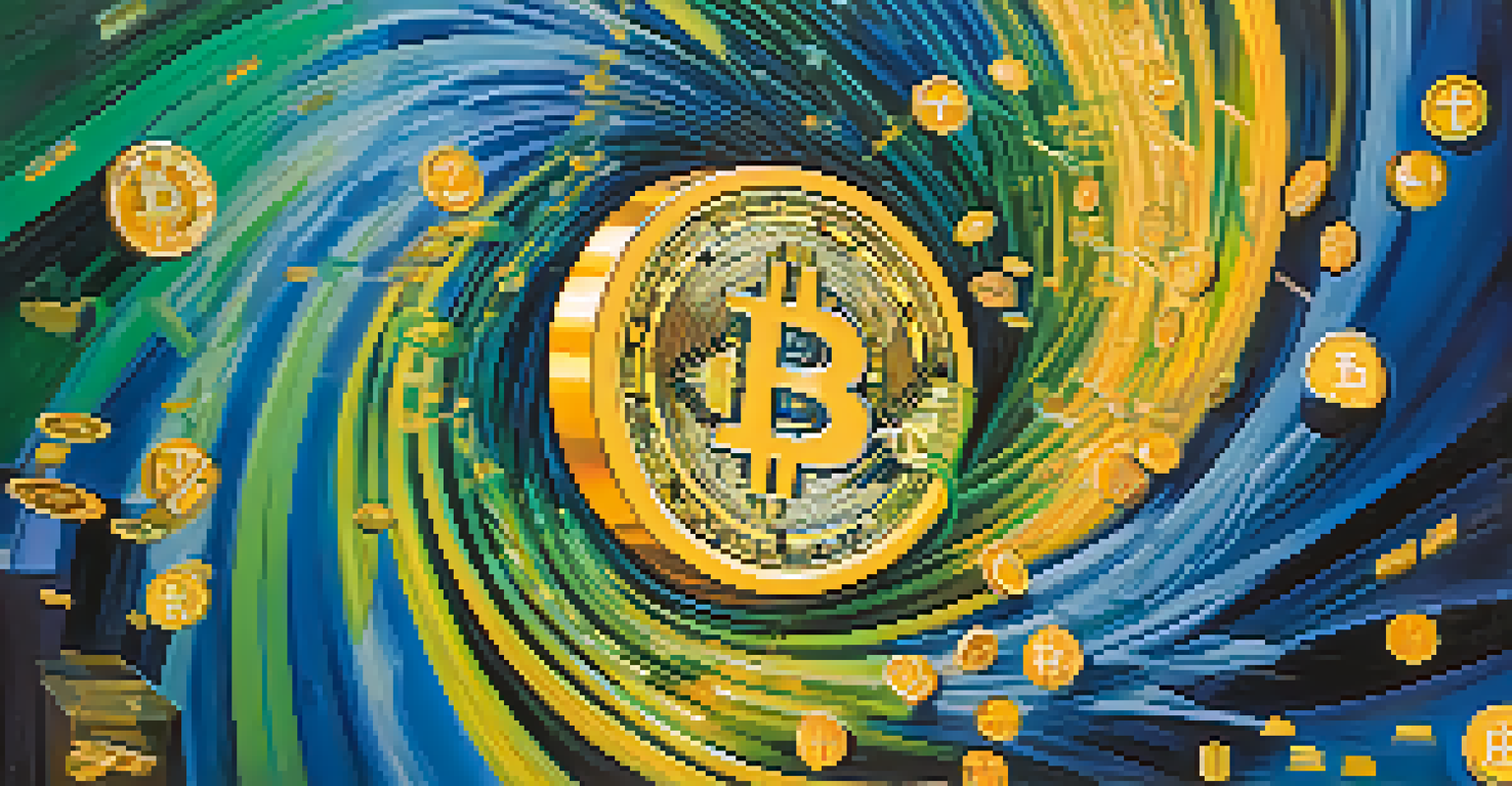The Role of Speculation in Bitcoin Price Movements

What is Speculation in the Cryptocurrency Market?
Speculation in the cryptocurrency market refers to the practice of buying and selling assets based on predictions about future price movements. This can often lead to significant volatility, as traders react to news, trends, and market sentiment rather than fundamental value. For example, someone might invest in Bitcoin because they believe it will soar due to increased adoption, regardless of its current valuation.
In the world of cryptocurrency, speculation is the lifeblood, driving prices to dizzying heights and plunging them into despair.
In cryptocurrencies, speculation is particularly prevalent due to the nature of the market, which is still relatively new and evolving. Many investors are drawn in by the potential for high returns, often based on little more than rumors or social media trends. This speculative behavior can create a rollercoaster effect, where prices rise rapidly before crashing just as quickly.
Understanding speculation is crucial for anyone involved in Bitcoin, as it contributes to the rapid price changes seen in the market. It's essential to recognize that while speculation can drive profits, it also comes with significant risks, highlighting the importance of informed decision-making.
Historical Price Movements Driven by Speculation
Looking back at Bitcoin's history, several key price movements can be attributed to speculation. For instance, the meteoric rise in late 2017 was fueled largely by hype and speculation, as mainstream media coverage brought in a wave of new investors. Many were drawn in by the fear of missing out (FOMO), leading to a massive price surge that ultimately resulted in a sharp correction.

Similarly, events like the announcement of institutional investments or regulatory news often spark speculative trading. Traders react quickly to these developments, either buying in anticipation of a price increase or selling to avoid losses. This behavior illustrates how news can create a ripple effect, influencing traders' perceptions and leading to speculative buying or selling.
Speculation Drives Crypto Volatility
In the cryptocurrency market, speculation often leads to significant price fluctuations as traders react to news and trends rather than fundamental values.
These historical examples serve as a reminder of the speculative nature of Bitcoin and how external factors can drive market sentiment. As such, understanding these patterns can help investors navigate the often unpredictable waters of cryptocurrency trading.
The Psychology Behind Bitcoin Speculation
The psychology of traders plays a significant role in Bitcoin speculation. Many investors are motivated by emotional factors such as fear and greed, which can lead to irrational decision-making. For example, during a price surge, greed may compel traders to buy in, while fear of loss can lead to panic selling when the market dips.
The market can remain irrational longer than you can remain solvent.
This psychological aspect is compounded by social media and online communities that amplify sentiments and trends. Platforms like Twitter and Reddit can quickly spread rumors or bullish forecasts, leading to collective action among traders. When a large group of people begins to speculate on Bitcoin's future, it can create a self-fulfilling prophecy, driving prices higher.
Understanding the psychology behind speculation is vital for anyone looking to invest in Bitcoin. By recognizing the emotional triggers that influence market behavior, traders can make more rational choices and potentially mitigate the risks associated with speculative trading.
The Role of Media in Bitcoin Price Speculation
Media coverage plays a crucial role in shaping public perception and influencing speculation in the Bitcoin market. Positive news stories about Bitcoin adoption or technological advancements can drive prices up, while negative coverage can have the opposite effect. For instance, when a major news outlet reports on a hack or regulatory scrutiny, it can lead to widespread panic selling.
Moreover, sensational headlines often attract attention and can perpetuate speculative trading. This creates a cycle where media coverage influences trader behavior, which in turn impacts price movements. As a result, understanding how media narratives affect the market is essential for investors looking to make informed decisions.
Psychology Influences Trading Decisions
Emotional factors like fear and greed heavily influence traders' decisions in Bitcoin speculation, often resulting in irrational market behavior.
Ultimately, being aware of the media's influence can help traders navigate the complexities of Bitcoin speculation. By critically analyzing news sources and separating hype from reality, investors can position themselves more favorably in the market.
Market Trends and Their Connection to Speculation
Market trends often act as a mirror reflecting the speculative nature of Bitcoin trading. Bull markets, characterized by rising prices, typically draw in more speculative investment as confidence grows. Conversely, bear markets can trigger fear, leading to selling and further price declines, creating a cycle of speculation that amplifies market movements.
For example, during a bull market, traders may start to believe in the long-term potential of Bitcoin, leading to more speculative buying. This creates a feedback loop where rising prices attract more investors, further pushing prices up until the market eventually corrects. Recognizing these trends can help traders anticipate potential shifts in the market.
Understanding market trends and their relationship with speculation allows investors to make more strategic decisions. By identifying whether the market is in a bullish or bearish phase, traders can better gauge the potential for price movements driven by speculative behavior.
Risk Management in Speculative Bitcoin Trading
With the volatility of Bitcoin prices, effective risk management is crucial for anyone engaging in speculative trading. One common strategy is to set stop-loss orders, which automatically sell Bitcoin if it reaches a certain price, helping to limit potential losses. This approach can provide a safety net in an unpredictable market, particularly when speculation drives sudden price changes.
Another method is to diversify investments, spreading funds across different cryptocurrencies or assets. This strategy can help mitigate risk, as the impact of a downturn in one asset may be offset by gains in another. Diversification allows traders to participate in the speculative nature of the market while reducing their overall exposure.
Media Shapes Market Sentiment
Media coverage plays a crucial role in influencing public perception and speculation in Bitcoin, as positive or negative news can rapidly impact prices.
Developing a solid risk management plan is essential for navigating the speculative Bitcoin landscape. By implementing strategies to protect investments, traders can participate in the excitement of speculation while safeguarding their financial interests.
The Future of Speculation in Bitcoin Markets
As the cryptocurrency market continues to evolve, speculation will likely remain a significant factor in Bitcoin price movements. New technologies, regulatory developments, and market participants will shape the landscape, creating both opportunities and challenges for traders. Understanding these dynamics will be critical for anyone looking to invest in Bitcoin moving forward.
Moreover, as institutional investors enter the market, the nature of speculation may shift. While retail investors often drive price movements through emotional trading, institutional players may bring a more analytical approach. This could lead to a more stable market, but speculation will still play a role in driving short-term price fluctuations.

Ultimately, the future of speculation in Bitcoin markets will depend on various factors, including market maturity, regulatory frameworks, and investor behavior. Staying informed about these trends will be essential for anyone looking to capitalize on the speculative nature of Bitcoin.